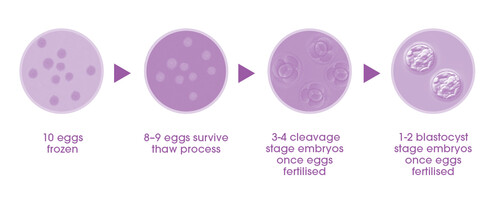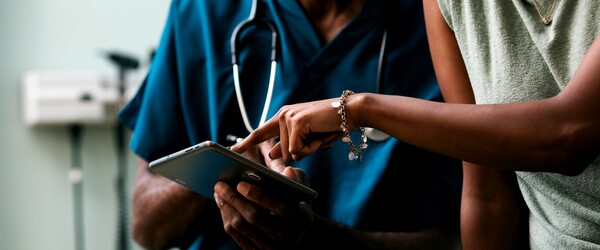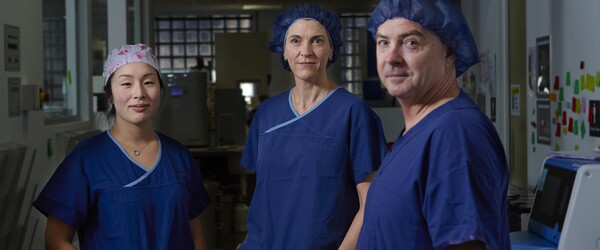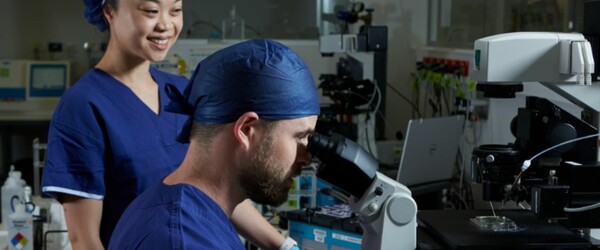Egg Freezing
If you’re not quite ready for motherhood, or still haven't met that special someone, have you thought about putting your eggs on ice?
When it comes to female fertility, timing is the most important factor, and being proactive can make a big difference in your chance of motherhood. These days, science has given women the option to say ‘yes’ to motherhood when you're ready.
Get the facts
What exactly is egg freezing?
Egg freezing is a method of storing a woman’s unfertilised eggs to allow her to try to conceive at a later date. It can be seen as a way of preserving the possibility of fertility for women who are not in a position to become pregnant straight away.
Female fertility is highly depending on a woman’s age. The number of eggs you produce rapidly declines as you get older, and sadly there is also an increased risk of miscarriage and chromosomal abnormalities.
The impact of age on fertility really starts to kick in for women over the age of 36. For this reason, we recommend considering freezing your eggs before the age of 35, since this will give you the highest chance of success later on.
Can I test my fertility potential now?
Ladies, meet the AMH Test.
Anti-Mullerian hormone (AMH) is a hormone secreted by cells in developing egg sacs (follicles), and the level of AMH in a your blood is a good indicator of your ovarian reserve.
The AMH Test can provide insight into the remaining quantity of eggs a woman has remaining, although it does not give any information about the quality of the eggs. AMH can be tested through a blood sample at any time of the month, plus, it can be tested while you are using hormonal contraception. It’s also usually one of the first steps for understanding if egg freezing could be right for you.
Egg Freezing Process
To put it simply, egg freezing requires 10-12 days of self-administered hormonal stimulation via daily injections, followed by a 20 minute collection procedure (usually done under light anaesthetic) followed by the freezing and storing of the eggs.
We’ve broken down the process of egg freezing in more detail for you here, also check out our FAQs below.
FAQs
How much does egg freezing cost?
In Australia, Medicare and other government subsidies are currently only payable for fertility treatment when there is a medical indication.
At IVF Australia, an Elective Egg Freezing Cycle costs $5,075. This includes the full cycle management and surgeon’s fee. View the breakdown via the table below.
Costs may vary subject to individual circumstances and there may also be costs for preliminary tests such as blood tests and an ultrasounds.
Below is the full breakdown of egg freezing costs at IVF Australia. Service Cost Notes Initial Consultation with a Fertility Specialist Consult fees vary based on the Specialist you select – ranging from $250 upwards, and Medicare Rebate of $80.85 available (with valid referral & Medicare eligible). *Bring a referral for a partial Medicare Rebate. Elective Egg Freezing Cycle Fee $5,075 *Includes cycle management, surgeon’s fee, and initial freeze. Day Hospital, Bed Fee & Anesthetist fee Approx. $1,930 *This may be covered by private health insurance. Medications Starting from $1,500 *These are a separate cost, payable to the pharmacy. Ongoing Egg Storage $275 per six months What are the chances of having a baby using frozen eggs?
Good question. It’s important to understand that the chance of success is largely determined by the woman’s age at the time of freezing.
Let’s break down the stats:
For a woman aged 35 or under, one stimulated cycle would result in the collection of 10 – 12 eggs, of which 7 – 9 would be suitable for vitrification and storage:
- Approximately 80-90% of eggs would survive warming in the future
- Approximately 50-80% of surviving eggs would fertilise
- Approximately 80-90% of fertilised eggs would develop into embryos
- A single embryo would have a 20-35% change of developing into a pregnancy

While these numbers may seem smaller than you might have expected, egg freezing is all about giving you the best possible chance of a successful pregnancy, even if you’re not ready until years down the track.
If you consider the statistics for natural conception, once a woman turns 36, the chance of conceiving is halved compared to her chance at 20 years of age. And at the age of 41, this chance falls to just 4%.
So ultimately, egg freezing enables women to explore all of their reproductive options, in her own time.
Ready to chat? Speak with the egg freezing experts today.
Our experienced fertility specialists would be happy to walk you through the process in more detail, to help you decide if egg freezing is the right option for you.





